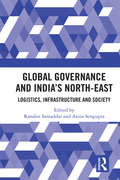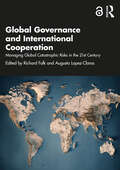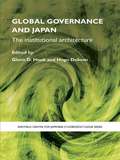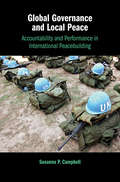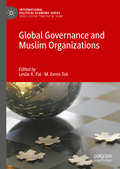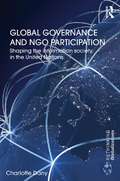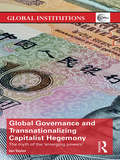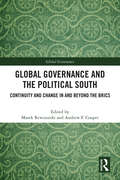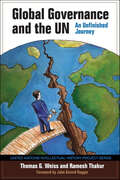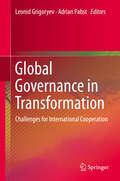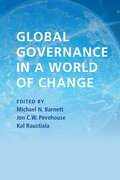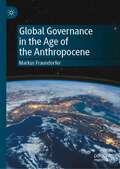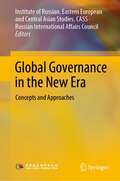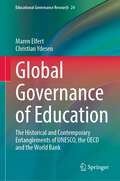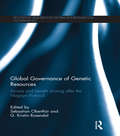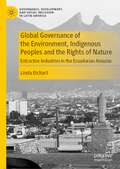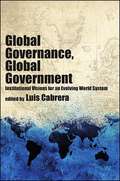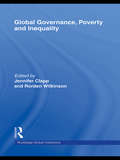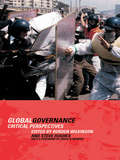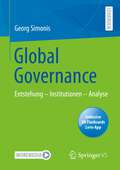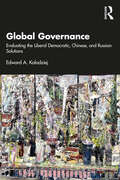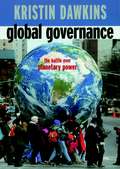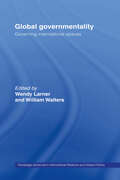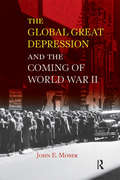- Table View
- List View
Global Governance and India’s North-East: Logistics, Infrastructure and Society
by Ranabir Samaddar Anita SenguptaThis book maps the convergence of governance and connectivity within Asia established through the spatial dynamics of trade, capital, conflict, borders and mobility. It situates Indian trade and governance policies within a broader Asian and global context. Focussing on India’s North-East, in particular on India’s Look and Act East Policy, the volume underscores how logistical governance in the region can bring economic and political transformations. It explores the projected development of the North-East into a gateway of transformative cultural interaction among people, just as the Silk Road became a conduit for Buddhism to travel along with musical instruments and tea. Comprehensive and topical, this book will be useful for scholars and researchers of political studies, international relations, governance studies, development studies, international trade and economics and for think tanks working on South and Southeast Asia.
Global Governance and International Cooperation: Managing Global Catastrophic Risks in the 21st Century
by Augusto Lopez-Claros Richard FalkThe Global Governance Forum and the Global Challenges Foundation collaborate in this collection in their concern that the UN Charter and the contemporary infrastructure for international cooperation are no longer fit for purpose and lack the instruments, resources and legitimacy to address the catastrophic risks threatening our future.Twenty-eight contributors offer thoughtful proposals for reforming existing international institutions and creating new ones to build a more peaceful, prosperous and just world, covering themes such as the management of weapons of mass destruction, collective security arrangements, justice and equity in economics, human rights, migration and refugees, climate mitigation, and food security, all bearing on the health of both people and planet.The vital project of this century is building institutions that will underpin global governance in coming decades, requiring imagination, persistence, empathy, and confidence that we will find a path to enhanced mechanisms of binding international law and the resources to make that happen. The volume is essential reading for scholars and researchers on international politics and public policy and indispensable for diplomats and government agencies.
Global Governance and Japan: The Institutional Architecture (The University of Sheffield/Routledge Japanese Studies Series)
by Glenn D. Hook Hugo DobsonLeading specialists from Europe and Japan examine the institutional mechanisms of governance at the global level and provide concrete evidence of the role Japan plays in these institutions. An excellent introduction to the concept of global governance, the volume analyzes how global governance actually works through the global institutional mechanisms of governance. It provides an up-to-date and contemporary analysis of the six most important global institutions, namely: the Group of 7/8 the Organisation for Economic Cooperation and Development the World Bank the International Monetary Fund the World Trade Organization the United Nations. Written clearly and concisely, the book provides a thorough and accessible discussion on Japan’s role within these institutions and uses supporting case studies to ask whether Japan is reactively or proactively involved in trying to shape these institutions in order to promote its own interests. As such, it will be a valuable resource for undergraduates and scholars with an interest in global governance, Japanese politics and political economy.
Global Governance and Local Peace: Accountability And Performance In International Peacebuilding
by Susanna P. CampbellWhy do international peacebuilding organizations sometimes succeed and sometimes fail, even within the same country? Bridging the gaps between the peacekeeping, peacebuilding, and global governance scholarship, this book argues that international peacebuilding organizations repeatedly fail because they are accountable to global actors, not to local institutions or people. International peacebuilding organizations can succeed only when country-based staff bypass existing accountability structures and empower local stakeholders to hold their global organizations accountable for achieving local-level peacebuilding outcomes. In other words, the innovative, if seemingly wayward, actions of individual country-office staff are necessary to improve peacebuilding performance. Using in-depth studies of organizations operating in Burundi over a fifteen-year period, combined with fieldwork in the Democratic Republic of the Congo, Nepal, South Sudan, and Sudan, this book will be of interest to scholars and students of international relations, African studies, and peace and conflict studies as well as policymakers.
Global Governance and Muslim Organizations (International Political Economy Series)
by M. Evren Tok Leslie A. PalThere are 1.6 billion Muslims in the world, represented on the world stage by 57 states, as well as a host of international organizations and associations. This book critically examines the engagement of these states in systems of global governance and with a variety of policy regimes, including climate change, energy, migration, humanitarian aid, international financial institutions, research and education. Chapters explore the dynamics of this engagement, the contributions to global order, the interests pursued and some of the contradictions and tensions within the Islamic world, and between that world and the ‘West’. An in-depth perspective is provided about the traditional and new forms of multilateralism and the policy spaces formed which provide new opportunities for the Muslim and non-Muslim world alike.
Global Governance and NGO Participation: Shaping the information society in the United Nations (Rethinking Globalizations)
by Charlotte DanyThis book explores the limits of NGO influence and the conditions that constrain NGOs when they participate in international negotiations Through an empirically rich study of the UN World Summits on the Information Society (WSIS) this book conceptualizes structural power mechanisms that shape global ICT governance and analyses the impact of NGOs on communication rights, intellectual property rights, financing, and Internet governance. The institutional framework of UN negotiations makes it easy for states to exclude NGOs from crucial meetings and to neglect their most relevant demands, in part explaining why NGOs had only limited influence on the policy outcomes of the WSIS in Geneva 2003 and Tunis 2005, although high numbers of NGOs participated. Using a critical perspective, Dany demonstrates that despite the far-reaching participation rights for civil society actors, structural power mechanisms continued to limit the influence of participating NGOs and this contradicts the widely held assumption that extensive NGO participation necessarily increases NGO influence on the policy outcomes. This book will be of interest to students and scholars of international relations, global governance, the United Nations, and global information and communication politics.
Global Governance and Transnationalizing Capitalist Hegemony: The Myth of the 'Emerging Powers' (Global Institutions)
by Ian TaylorThis book is a critique of claims regarding how emerging economies are supposedly rewriting the rules of global governance and ushering in alternative models to neoliberal orthodoxy. It argues that such assumptions are abstractions that ignore both the transnationalizing nature of the global political economy and the actual policy goals of the ruling classes within most emerging economies. Considering the larger issues behind the emerging economies (or powers) debate, the book deploys an adapted global capitalism perspective with insights from Gramsci, Poulantzas and Cox, to argue that the transnational nature of the global political economy and the actual policy goals of the dominant elites within most emerging economies merge to undermine any transformative element. Far from challenging the global order, these ostensible new rivals in fact seek to integrate their economies more and more within the existing liberal global economy. Inter-state dynamics and even inter-elite tensions exist and it is clear that the nation state has not simply become a transmission belt for global capital, but equally we must move beyond the surface phenomena that are most visible in global tensions to get at the underlying essence of social and class forces in the global political economy. Looking at the largest emerging powers, such as Brazil, Russia, India and China, Taylor explains why the emerging powers’ elites, although essentially subscribing to neoliberalism (in all its variegated forms) may confront the core in a myriad of ways, but that these are not challenges to the ongoing world order and, in fact, the so-called emerging powers serve a legitimizing function for the extant global system. The book will be of great use to graduates and scholars of International Relations, Global/International Political Economy and International Development.
Global Governance and the Political South: Continuity and Change In and Beyond the BRICS (Global Governance)
by Marek Rewizorski Andrew F CooperThis book gives a new compelling meaning to the metaphor of ‘Global South’ against the background of the global political challenge to international order, driven not only through the BRICS grouping, but also by the activities of middle powers striving to alter the political status quo. Expert contributors highlight the interplay between politics, economy, and security, offering insights into how the Global South perceives and responds to pivotal events like the Russian invasion of Ukraine, the COVID-19 pandemic, and the 2008 Financial Crisis. They uncover how non-Western countries interpret and react to these turning points, and explore a diverse array of interests, values, and political behaviours often misunderstood in the West. The volume also examines whether initiatives from the Global South can reshape global governance institutions, influence the existing structures, and provide a historical and philosophical context to understand the continuities and changes in global governance. Ideal for scholars and students, this book is a must-read for anyone interested in the rise and influence of the Global South, BRICS, global governance, and the evolving international system.
Global Governance and the UN: An Unfinished Journey (United Nations Intellectual History Project Series)
by Thomas G. Weiss Ramesh ThakurIn the 21st century, the world is faced with threats of global scale that cannot be confronted without collective action. Although global government as such does not exist, formal and informal institutions, practices, and initiatives—together forming "global governance"—bring a greater measure of predictability, stability, and order to trans-border issues than might be expected. Yet, there are significant gaps between many current global problems and available solutions. Thomas G. Weiss and Ramesh Thakur analyze the UN's role in addressing such knowledge, normative, policy, institutional, and compliance lapses. The UN's relationship to these five global governance gaps is explored through case studies of some of the most burning problems of our age, including terrorism, nuclear proliferation, humanitarian crises, development aid, climate change, human rights, and HIV/AIDS.
Global Governance in Transformation: Challenges for International Cooperation
by Adrian Pabst Leonid GrigoryevThis book analyzes the state of global governance in the current geopolitical environment. It evaluates the main challenges and discusses potential opportunities for compromise in international cooperation. The book’s analysis is based on the universal criteria of global political stability and the UN framework of sustainable development. By examining various global problems, including global economic inequality, legal and political aspects of access to resources, international trade, and climate change, as well as the attendant global economic and political confrontations between key global actors, the book identifies a growing crisis and the pressing need to transform the current system of global governance. In turn, it discusses various instruments, measures and international regulation mechanisms that can foster international cooperation in order to overcome global problems. Addressing a broad range of topics, e.g. the international environmental regime, global financial problems, issues in connection with the energy transition, and the role of BRICS countries in global governance, the book will appeal to scholars in international relations, economics and law, as well as policy-makers in government offices and international organizations.
Global Governance in a World of Change
by Michael N. Barnett Pevehouse, Jon C.W. Kal RaustialaGlobal governance has come under increasing pressure since the end of the Cold War. In some issue areas, these pressures have led to significant changes in the architecture of governance institutions. In others, institutions have resisted pressures for change. This volume explores what accounts for this divergence in architecture by identifying three modes of governance: hierarchies, networks, and markets. The authors apply these ideal types to different issue areas in order to assess how global governance has changed and why. In most issue areas, hierarchical modes of governance, established after World War II, have given way to alternative forms of organization focused on market or network-based architectures. Each chapter explores whether these changes are likely to lead to more or less effective global governance across a wide range of issue areas. This provides a novel and coherent theoretical framework for analysing change in global governance.
Global Governance in the Age of the Anthropocene
by Markus FraundorferWhy has global governance largely failed to effectively tackle some of the most pressing global environmental challenges of our time? What are the obstacles to effective global and planetary problem-solving? And which solutions and responses have global governance actors come up with to confront these challenges? This textbook teases out the tragic entanglements between dominant global governance dynamics and the global environmental challenges of the Anthropocene, showing how international and global cooperation mechanisms that evolved over the last two hundred years are deeply implicated in exacerbating many of today’s global environmental challenges. The book focuses on several global environmental challenges which are intrinsically interconnected, threatening to destabilise the entire Earth-system with serious consequences for human societies across the world. These global environmental challenges include infectious disease outbreaks, global food production processes, the pollution of freshwater resources, energy consumption patterns, deforestation and CO2 emissions. At the same time, the book also presents several alternative governance examples based on more democratic, citizen-based and holistic approaches to the global climate crisis, which point the way towards a new understanding of global governance in the age of the Anthropocene. This textbook is for undergraduate and postgraduate students of global governance, environmental politics and international relations.
Global Governance in the New Era: Concepts and Approaches
by Institute of Russian, Eastern European and Central Asian Studies, CASS Russian International Affairs CouncilThis book mainly introduces the concepts and approaches of global governance from the viewpoints of Chinese and Russian scholars and is divided into four parts. The first one deals with the concept of a new type of global governance, namely “Globalization 2.0”. The second one is dedicated to institutions and multilateralism, including the importance and effectiveness of international institutions. The third part focuses on the important countries and regions in the new era, as well as such issues as the current global status quo, processes in Eurasia, the prospects of the U.S. – China – Russia trilateral relationship. The last part analyzes the future development of global governance and possible solutions of how it might be improved. Climate change, digital era, cyber security, financial and economic regimes, COVID-19 are all involved in this part. In short, this book is a profound and cutting-edge research on global governance.
Global Governance of Education: The Historical and Contemporary Entanglements of UNESCO, the OECD and the World Bank (Educational Governance Research #24)
by Maren Elfert Christian YdesenThis book examines the educational role of three international organizations created as part of the post-World War II multilateral architecture: the United Nations Educational, Scientific and Cultural Organization (UNESCO), the World Bank, and the Organisation for Economic Co-operation and Development (OECD). These organizations have significantly promoted and shaped education as a fundamental feature of the modernization of society and contributed to the globalization of educational norms, policies and technologies. Drawing on primary source materials and interviews, the book provides novel perspectives to the literature on the global governance of education by focusing on the historical entanglements, relations and power struggles between these three organizations, rather than treating them separately. The study sheds light on the homogenizing effects of globalized educational policy-making and the shifting power dynamics in the global governance of education.‘This book makes a very distinctive and important contribution to the literature that critically analyses the influence of the global agencies on education globally; it goes beyond the standard discursive analyses of policy texts to also explore the history of those organisations through archival research and in-depth interviews of the key personnel. What emerges is a powerful analysis which locates those agencies within their historical epochs and shines a light on their tensions and micro-politics, both internally and between organisations.’ Paul Morris, Professor of Comparative Education, Institute of Education, University College London, UK‘A must-read historical account of the intermingling, boundary setting and competition between the three big intergovernmental organizations (IOs) in education: OECD, UNESCO, and the World Bank. Different from other scholars that document how these IOs have transformed themselves in response to external and internal changes, Elfert and Ydesen draw attention to the relational aspect: how have these three IOs navigated conflict, carved niches, and used and abused each other to amplify and expand their own mission? How have they done so in an environment that is crowded with intergovernmental and international organizations, each with a claim to govern education globally?’Gita Steiner-Khamsi, Professor of Comparative and International Education, Teachers College, Columbia University; UNESCO Chair of Comparative Education Policy of the Geneva Graduate Institute of International and Development Studies'This volume is a thoughtful and timely work of scholarship. Understanding the roles of UNESCO, the OECD and the World Bank is central to understanding contemporary education in global perspective. Elfert and Ydesen’s historical analysis sets out in rigorous detail how these organisations have evolved, and what has shaped and driven this evolution. The historical analysis is complemented by contemporary interview data, facilitating an actor-level analysis as well as a broader picture. The book is conceptually and theoretically rich while being accessibly written; the authors manage complexity remarkably well. For anyone interested in global governance and the role of international organisations, or anyone who wants to understand in general how global educational agendas have developed and converged, this book is a most valuable read.' Michele Schweisfurth, Professor of Comparative and International Education, University of Glasgow, UKChapter "UNESCO, the OECD and the World Bank: A Global Governance Perspective” is available open access under a Creative Commons Attribution 4.0 International License via link.springer.com.
Global Governance of Genetic Resources: Access and Benefit Sharing after the Nagoya Protocol (Routledge Research in Global Environmental Governance)
by Sebastian Oberthür G. Kristin RosendalThis book analyses the status and prospects of the global governance of Access Benefit Sharing (ABS) in the aftermath of 2010’s Nagoya Protocol to the Convention on Biological Diversity (CBD). The CBD’s initial 1992 framework of global ABS governance established the objective of sharing the benefits arising from the use of genetic resources fairly between countries and communities. Since then, ABS has been a contested issue in international politics – not least due to the failure of effective implementation of the original CBD framework. The Nagoya Protocol therefore aims to improve and enhance this framework. Compared to the slow rate of progress on climate change, it has been considered a major achievement of global environmental governance, but it has also been coined a ‘masterpiece of ambiguity’. This book analyses the role of a variety of actors in the emergence of the Nagoya Protocol and provides an up-to-date assessment of the core features of the architecture of global ABS governance. This book offers a central resource regarding ABS governance for those working on and interested in global environmental governance. This is achieved by focusing on two broad themes of the wider research agenda on global environmental governance, namely architecture and agency. Furthermore, individual chapter contributions relate and link ABS governance to other prominent debates in the field, such as institutional complexes, compliance, market-based approaches, EU leadership, the role of small states, the role of non-state actors and more. Partly due to its seeming technical complexity, ABS governance has so far not been at the centre of attention of scholars and practitioners of global environmental governance. In this book, care is taken to provide an accessible account of key functional features of the governance system which enables non-specialists to gain a grasp on the main issues involved, allowing the issue of ABS governance to move centre-stage and be more fully recognised in discussions on global environmental governance.
Global Governance of the Environment, Indigenous Peoples and the Rights of Nature: Extractive Industries in the Ecuadorian Amazon (Governance, Development, and Social Inclusion in Latin America)
by Linda EtchartThis book explores the obstacles facing indigenous communities, non-governmental organizations, governments, and international institutions in their attempts to protect the cultures of indigenous peoples and the world’s remaining rainforests.Indigenous peoples are essential as guardians of the world’s wild places for the maintenance of ecosystems and the prevention of climate change. The Amazonian/Andean indigenous philosophies of sumac kawsay/suma qamaña (buen vivir) were the inspiration for the incorporation of the Rights of Nature into the Ecuadorian and Bolivian constitutions of 2008 and 2009. Yet despite the creation of the United Nations Permanent Forum on Indigenous Issues (2000), and the adoption of the United Nations Declaration on the Rights of Indigenous Peoples (2007), indigenous peoples have been marginalized from intergovernmental environmental negotiations. Indigenous environment protectors’ lives are in danger while the Amazon rainforests continue to burn.By the third decade of the 21st century, the dawn of “woke” capitalism was accompanied by the expansion of ethical investment, with BlackRock leading the field in the “greening” of investment management, while Big Oil sought a career change in sustainable energy production. The final chapters explain the confluence of forces that has resulted in the continued expansion of the extractive frontier into indigenous territory in the Amazon, including areas occupied by peoples living in voluntary isolation.Among these forces are legal and extracurricular payments made to individuals, within indigenous communities and in state entities, and the use of tax havens to deposit unofficial payments made to secure public contracts. Solutions to loss of biodiversity and climate change may be found as much in the transformation of global financial and tax systems in terms of transparency and accountability, as in efforts by states, intergovernmental institutions and private foundations to protect wild areas through the designation of national parks, through climate finance, and other “sustainable” investment strategies.
Global Governance, Global Government: Institutional Visions for an Evolving World System
by Luis CabreraRecent years have seen a remarkable resurgence in rigorous thought on global government by leading thinkers in international relations, economics, and political theory. Not since the immediate post-World War II period have so many scholars given serious attention to possibilities for global political integration.This book will be of interest to students of international relations, political theory, international economics, secuity and gender studies. It pulls together some of the leading current thinkers on global government into a conversation about provocative global institutional visions. Chapters here explore whether a world state should be viewed as inevitable, ways in which global moral and political communities might be sustained, and reasons to reject world government in favor of improvements to governance in the United Nations and other institutions.
Global Governance, Poverty and Inequality (Global Institutions)
by Jennifer ClappA series of crises unfolded in the latter part of the first decade of the 21st Century which combined to exacerbate already profound conditions of global economic inequality and poverty in the world’s poorest countries. In 2007, the unsound lending practices that caused a collapse in the US housing market ushered in a broader economic crisis that reverberated throughout the global financial system. This economic shockwave had a global impact, triggering not just instability in other industrialized countries, but also in their developing world counterparts, also highlighting deficiencies in the current structures of global governance to protect the world’s poorest and most disadvantaged. This book offers answers to questions raised about the role of global governance in the attenuation and amelioration of world poverty and inequality. The contributors interrogate the role of systems of governance at a time of global economic crisis and continuing environmental degradation against a backdrop of acceleration in inequalities within and between communities and across the globe. Evaluating how existing systems can be reformed or redesigned to be more effective at addressing issues of poverty and inequality and providing a comprehensive discussion of a wide range of global governance initiatives this work will be essential reading for students and scholars of global governance, international relations and international organizations.
Global Governance: Critical Perspectives
by Steve Hughes Rorden WilkinsonIn recent years, the role of global institutions such as the United Nations, World Trade Organization, International Monetary Fund and the World Bank has never been more important to the lives of individuals throughout the world. This edited book provides critical perspectives on the role of these institutions and how they use their policies, procedures and practices to manage global political, socio-economic, legal and environmental affairs. In contrast to previously published books on this subject, Global Governance is organized thematically rather than by institution. Each chapter examines core issues such as labour, finance, the environment, health, culture, gender, civil society, poverty and development. It should be essential reading for undergraduate students of international politics, international political economy and international economics.
Global Governance: Entstehung – Institutionen – Analyse
by Georg SimonisDieses Lehrbuch führt ein in die politikwissenschaftliche Debatte über Global Governance. Die mit dem Konzept der Global Governance verfolgte analytische Perspektive untersucht Weltordnungsprobleme und begreift das internationale System als ein Mehrebenensystem. Global Governance erfolgt im Rahmen von internationalen Institutionen (Internationale Organisationen, Regime und Netzwerke) und unter Beteiligung staatlicher, privater und hybrider Akteure. Seit dem Ende des Kalten Krieges haben institutionalisierte Formen kooperativer Problembewältigung an Bedeutung gewonnen – gegenwärtig in der Auseinandersetzung mit neo-nationalistischen Strömungen – und verändern das Staatensystem. Aktuelle Stichworte sind hier neben der Sicherheitsgovernance: Finanz-, Klima- und Gesundheitsgovernance.Zusätzliche Fragen per App: Laden Sie die Springer-Nature-Flashcards-App kostenlos herunter und nutzen Sie exklusives Zusatzmaterial, um Ihr Wissen zu prüfen.
Global Governance: Evaluating the Liberal Democratic, Chinese, and Russian Solutions
by Edward A. KolodziejHow do we prevent the next pandemic? Will governments successfully tackle climate change? Will they find ways to close the gap between the haves and have-nots and to eliminate poverty? Which solution – democratic or authoritarian – will determine the global governance of a f lawed nation-state system? This unique contribution to global studies advances a multidisciplinary theory that the governments of all human societies are the tenuous outcome of the competing solutions to the Imperatives of Order, Welfare, and Legitimacy (OWL). The OWL paradigm provides a common framework to evaluate the contrasting responses of the liberal democratic, Chinese, and Russian solutions to global governance. Underscored is the volume’s contention that global governance is the overriding issue confronting nation-states and the diverse and divided peoples of what is now a global society for the first time in the evolution of the species. The volume addresses a wide spectrum of audiences, united in their shared resolve that the democracies prevail in a projected century-long struggle between democratic and authoritarian regimes to determine global governance. Scholars, teachers, students, elected officials, policy analysts, media professionals, and engaged citizens who make self-government work will profit from this visionary and provocative study.
Global Governance: The Battle over Planetary Power (Open Media Series)
by Kristin DawkinsIn Global Governance, policy analyst Kristin Dawkins offers a refreshingly hopeful and astute roadmap towards a democratic future, framing the respective roles and accomplishments of corporations, governments, and citizen activists in light of the day-to-day needs of communities around the world. Written with an eye to the realities of power, Global Governance explores the origins and current state of play in the major global institutions, the rising dominance of global corporations and the growing wealth of the world's political elite. In describing the impacts of international trade, aid and development loans on Southern economies and communities, Dawkins carefully explains the way governmental policies overseas become instruments of coercion in the context of globalization.Writing with a passionate commitment to justice and democracy, Dawkins points out that the U.S. government is becoming increasingly hostile to the UN - even though many of the UN's institutions and treaties were designed to address poverty and the other problems created by globalization. At a time when the UN's very survival is being questioned, Global Governance is an urgent call to revitalize multilateralism and to build powerful new tools for democratic global governance.
Global Governmentality: Governing International Spaces (Routledge Advances in International Relations and Global Politics #28)
by Wendy Larner William WaltersFoucault's thoughts on governmentality have made a significant impact on the studies of power and governance in modern societies. However, most studies of governmentality confine themselves to the exploration of power within nation-states. Global Governmentality extends Foucault's political thought towards international studies, exploring the governance of the global, the international, the regional and many other extra-domestic spaces.Combining historical and contemporary outlooks, this book offers innovative interdisciplinary explorations of such issues as international peacekeeping, refugees, political rationalities of security and neoliberalism, the spatiality of globalization, the genealogy of development, and the ethical governance of corporate activity.At a time when many of the geopolitical and economic certainties which framed international affairs are in flux, Global Governmentality is suggestive of new territories and lines for international analysis. It will be of interest to students and researchers of both governmentality and international studies.
Global Great Depression and the Coming of World War II (United States in the World)
by Alison Cook-Sather John E Moser"The Global Great Depression and the Coming of World War II" demonstrates the ways in which the economic crisis of the late 1920s and early 1930s helped to cause and shape the course of the Second World War. Historian John E. Moser points to the essential uniformity in the way in which the world s industrialized and industrializing nations responded to the challenge of the Depression. Among these nations, there was a move away from legislative deliberation and toward executive authority; away from free trade and toward the creation of regional trading blocs; away from the international gold standard and toward managed national currencies; away from chaotic individual liberty and toward rational regimentation; in other words, away from classical liberalism and toward some combination of corporatism, nationalism, and militarism.For all the similarities, however, there was still a great divide between two different general approaches to the economic crisis. Those countries that enjoyed easy, unchallenged access to resources and markets the United States, Great Britain, the Soviet Union, and France tended to turn inward, erecting tariff walls and promoting domestic recovery at the expense of the international order. On the other hand, those nations that lacked such access Germany and Japan sought to take the necessary resources and markets by force. The interplay of these powers, then, constituted the dynamic of international relations of the 1930s: have-nots attempting to achieve self-sufficiency through aggressive means, challenging haves that were too distrustful of one another, and too preoccupied with their own domestic affairs, to work cooperatively in an effort to stop them."
Global Growth and Financial Spillovers and the South African Macro-economy
by Mthuli Ncube Eliphas Ndou Nombulelo GumataTo what extent is South Africa affected by G8 economies and BRIC growth shocks? This book identifies channels that amplify these shock effects, the relevance of third country transmission effects and the effects of the first and second rounds of US quantitative easing. The changing reactions of South African variables over time to financial shocks emanating from the US and selected countries in the Euro area, is presented. The book quantifies the effects of capital flow shocks, determines the counterfactuals of asset prices and economic growth variables, and compares the contribution of capital flows and domestic macro factors on asset prices. The effects of the exchange rate depreciation are contrasted to the decline in investment as key drivers of the trade balance. Stock market interdependence is determined amongst South African, Indian and Brazilian equities. The contributions of stock price returns and volatility on South African economic growth are contrasted. The authors construct a financial stress index for South Africa and determine how it amplifies shocks.
